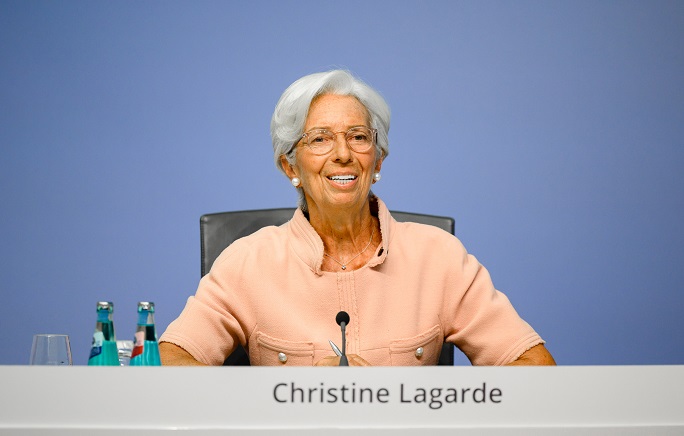ECB keeps monetary policy on hold, will monitor rise of euro
Published : 10 Sep 2020, 23:52
The European Central Bank (ECB) on Thursday decided to keep key interest rates unchanged and made no changes to its forward guidance and asset purchase programs, reported Xinhua.
The 19-nation eurozone base interest rate will remain at 0.00 percent, with the marginal lending rate and deposit rate remaining at 0.25 percent and minus 0.50 percent, respectively, according to a press release issued following the ECB's monetary policy meeting.
The ECB's Governing Council said it will continue its purchases under the pandemic emergency purchase program, with a total envelope of 1,350 billion euros, as well as its regular asset purchase program.
It said it will also continue to provide ample liquidity through refinancing operations, adding that the latest operation in the third series of targeted longer-term refinancing operations (TLTRO III) "has registered a very high take-up of funds, supporting bank lending to firms and households."
It is also reiterated that the Governing Council "continues to stand ready to adjust all of its instruments, as appropriate, to ensure that inflation moves towards its aim in a sustained manner, in line with its commitment to symmetry."
In an analysis of the macro-economic condition, Christine Lagarde, president of the ECB, said that incoming data since last policy meeting suggest a strong rebound in activity broadly in line with previous expectations, but the strength of the rebound remains uncertain, leaving the ECB to reconfirm its accommodative monetary policy stance.
Noting a significant rebound in industrial and services production and signs of a notable recovery in consumption, Lagarde also mentioned that momentum has recently slowed in the services sector compared with the manufacturing sector.
Overall, the ECB staff forecast that, in the baseline scenario, the euro zone annual real GDP will fall by 8.0 percent in 2020, expand by 5.0 percent in 2021 and grow by 3.2 percent in 2022. Compared with projections in June, the GDP growth outlook has been revised slightly up for 2020 and is largely unchanged for 2021 and 2022.
The ECB foresees annual inflation at 0.3 percent in 2020, 1.0 percent in 2021 and 1.3 percent in 2022. The inflation outlook is unchanged for 2020, revised up for 2021, and is unchanged for 2022, compared with projections three months ago.
"In the near term price pressures will remain subdued owing to weak demand, lower wage pressures and the appreciation of the euro exchange rate," Lagarde said, adding that a recovery in demand will put upward pressure on inflation again over the medium term.
The exchange rate of the euro was a major concern at Thursday's press conference. The single currency has appreciated considerably since March and touched a two-year high of 1.20 U.S. dollars last week.
Taking several questions on the rise of the euro, Lagarde said the development has been discussed among the ECB officials, since it could put pressure on prices. But she stressed that the ECB does not target exchange rates in its mandate.
Lagarde said the exchange rate of the euro will be "monitored carefully", chiming in with the Governing Council statement that it "will carefully assess incoming information, including developments in the exchange rate, with regard to its implications for the medium-term inflation outlook."
The recent surge of euro is partly linked to a policy shift announced by the U.S. Federal Reserve in late August. The Fed said it now seeks to achieve inflation that averages 2 percent over time, a policy strategy that is likely to keep short-term interest rates near zero for years.
When asked about the ECB's own monetary policy strategy review, Lagarde said the ECB will soon reactivate the review, which had previously been postponed due to the COVID-19 pandemic.
The review will examine topics such as price stability objective, euro-system modeling, digitalization, climate change, financial stability and the interaction of the monetary policy and fiscal policy, Lagarde told the press conference.


